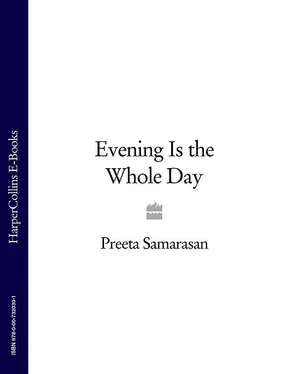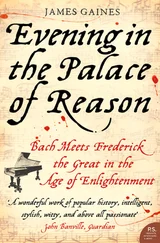Tata’s last home-improvement venture before he died was to paint the outside of the house an unapologetic peacock blue, as if to stamp upon the building his ownership, his nation’s liberty and his own. It was a color Tata’s neighbors were accustomed to seeing only in wedding sarees and Mughal miniature paintings. Now the house practically glowed in the dark. The Big House. 79 Kingfisher Lane. You can’t miss it, people took to saying when giving directions. It’s nothing like the others. Appa’s one concession to the mawkish sentimentality of the Indian son, as far as his children were ever able to tell, was to select the same blinding color every five years when he had the house repainted. “Any other color just wouldn’t be the same,” he’d say with a regretful headshake. “Got to honor the old man’s magnificent jasmine-and-marigolds curdrice-and-pickle Madras-masala aesthetic sensibilities.”
WHEN TATA keeled over in his vegetable garden one luminous May morning in 1958, Paati ordered her daughters to summon their oldest brother. Then she settled herself on the south-facing porch (noncovered, alas) to wait, squinting at the horizon as if she could see the hump of Singapore rising like a turtle’s back through the blue water three hundred miles away, and astride that hump, like the Colossus of Rhodes, her fearless firstborn, ready to clear the Tebrau Strait in a single leap and come lumbering across the land into this manless garden, law degree in one hand and hoe in the other. At dusk her daughters begged her to come indoors; at eight, despairing, they brought her mosquito coils and a pillow for her back. But she barked her questions without looking at them. At what time had the telegram been sent? Had a response been received? At what time was Raju to start from Singapore? In the morning she was still there in her rattan chair, covered in red bites the size of grapes, her voice hoarse from the smoke of the useless mosquito coils. Scratching furiously, she got up to greet Appa as his pea-green Morris Minor pulled into the driveway.
“I dropped everything and sped straight home, foof! ” he was to tell his children years later. “Just like that I had to tender my resignation. Tup-tup-tup and I was standing here consoling the old lady and taking charge of everything.” Tup-tup-tup and three snaps of his fingers. So magical had been his haste, so uncanny the lightning progress of the Morris Minor on the old backcountry byways. “Just imagine,” Appa would say, “just try and imagine if you can. Zipped home just like that.” And dutifully the children would feel the wind of that speed in their faces, and see unanimously the image each one had purloined without a word from the thoughts of the other: a young Appa zooming through the brightening air with one arm stuck straight out before him like some undersized, chicken-chested superhero.
After Tata’s funeral, Appa bagged a coveted associateship in the venerable law firm of Rackham Fields & Company. Though his bosses were all British for now, they’d be throwing up their jobs and leaving one by one, and whom would they choose to fill their shoes if not a fellow who’d come down from Oxford with first-class honors? Both precedent and informed speculation suggested that such a job would provide the perfect sparkling counterpoint to the meteoric political career Appa envisioned for himself. He had inherited —oh, most precious of legacies! —his father’s uncompromising ambition. With a bit of work everything would be his: a Mercedes in the driveway, a Datukship on the King’s birthday, the country itself. The whole country, his for the taking, his generation’s. What an inheritance! They would not squander it. They would make this country the envy of all Asia, even of the bloody British themselves.
As part of the understanding that he would see his sisters well settled, Appa had also inherited an ancillary tripartite legacy: 1) the Big House, that twisted, hulking setting of his father’s twilight years; 2) half of the shipping company; 3) the lion’s share of Tata’s wisely invested nest egg.
The house welcomed its new lord with wide-open doors and a garland of vermilioned mango leaves strung across the top of the front doorway. But the shipping company, managed these past two years by a loyal secretary, could no longer be kept. “I’m a barrister, not a bloody boatman,” Appa declared to anyone who would listen. “And my brother is a fool. Amateur and professional. You think sambaing and rumbaing will keep the boats afloat or what?” So the company was sold, the rubber, cement, durian, and tapioca investments divided, and Uncle Ballroom’s share grudgingly forwarded to him in Europe per his instructions. Appa gave the boy five months (in the end it took seven) to spend it all before he began dashing off desperate pleas for more. Ah, well. The luckiest of men had thorns in their sides, and unlike some, he, at least, didn’t have to worry about a younger brother who would stumble into an unsuitable match with a dimwitted troglodyte, spawn six snotty brats, and ensconce himself and his family in a spare room upstairs whence they would all descend in a cavalcade for free idli sambar at each mealtime. No, such burdens would almost certainly never be his: on the shelf in the dining room sat his brother’s latest All-Round Ballroom Champion trophy and a framed photograph of him and his partner in some obscenely gilded ballroom in Vienna, in exactly the same pose as the faceless gold-trophy couple. Thus freed of the firstborn’s burden, Appa invested his half of the nest egg twice-wisely and pondered his place in the newborn nation.
Конец ознакомительного фрагмента.
Текст предоставлен ООО «ЛитРес».
Прочитайте эту книгу целиком, купив полную легальную версию на ЛитРес.
Безопасно оплатить книгу можно банковской картой Visa, MasterCard, Maestro, со счета мобильного телефона, с платежного терминала, в салоне МТС или Связной, через PayPal, WebMoney, Яндекс.Деньги, QIWI Кошелек, бонусными картами или другим удобным Вам способом.












